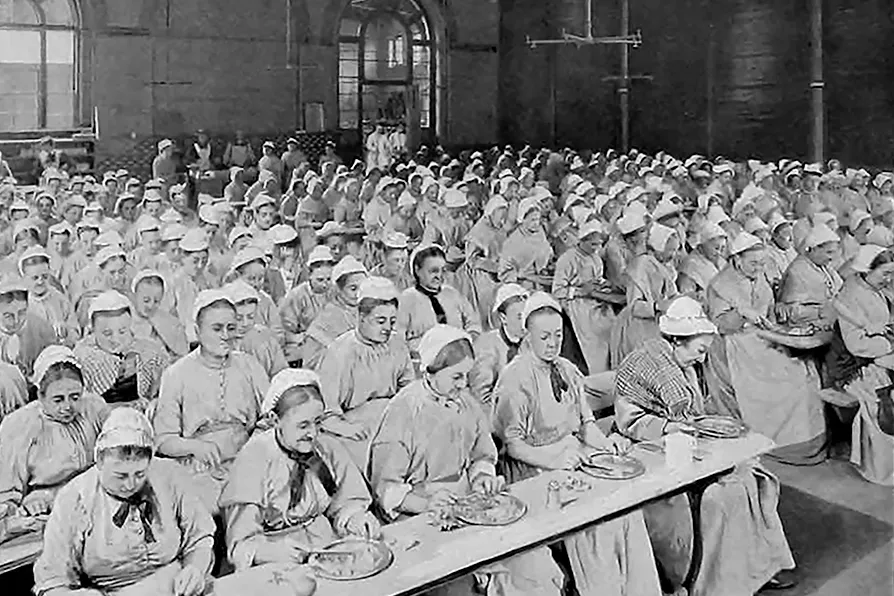As tens of thousands return to the streets for the first national Palestine march of 2026, this movement refuses to be sidelined or silenced, says PETER LEARY
Error message
An error occurred while searching, try again later.KEITH FLETT looks at the long history of coercion in British employment laws

 GUILTY OF POVERTY: Dinner time in St Pancras Workhouse, London, October 2011 / Pic: Unknown/CC
GUILTY OF POVERTY: Dinner time in St Pancras Workhouse, London, October 2011 / Pic: Unknown/CC
JULY is the month of the year that sees two of the great festivals of the British labour movement, the Durham Miners’ Gala and the Tolpuddle Martyrs Festival. Both focus on key moments of working people’s history but also situate them in present-day struggles.
When Secretary of State for Work and Pensions Liz Kendall revealed her cuts to benefits no-one mentioned the “less eligibility principle.” Part of what Kendall was after was making it clear that being in a job, even if this was a tough choice for an individual, would be better in some cases than being on a health-related benefit.
The principle is not new, although it was officially abolished in 1929 in Britain. It was at the centre of the 1834 Poor Law Amendment Act. It was passed not by a Tory but by a Liberal government and it set up workhouses.
In the 1830s workhouses were called Bastilles by radicals and attempts were made to destroy them.
The principle was that if someone could not support themselves then they could go to a workhouse. Central to that was that life was so unpleasant in the workhouse that anyone, even vaguely capable of working would surely endeavour to do so rather than enter one.
EP Thompson in the Making of the English Working Class touched on the utilitarian principles on which workhouses were run.
He quotes one poor law commissioner as reporting that the “intention was to make the workhouses as much like a prison as possible. Another said the idea was to make the discipline ‘so severe and repulsive as to make them a terror to the poor’.”
Given the government can’t find enough prison places — largely thanks to the previous Tory regime but also due to sending people like climate protesters to jail who shouldn’t be there — building and staffing a 2025 workhouses seems unlikely to happen.
The perspective of making life without a job as miserable as possible however remains, because employers will not make the adjustments they are legally required to do to make jobs doable.
The Tolpuddle Martyrs Festival commemorates both the victimisation of trade unionists but also the successful fight to reverse their banishing to Australia. The long fight for union rights, of which 1834 was a key moment, continues in 2025.
The government’s Employment Relations Bill is currently in the Lords and parts may become law in 2026. It is some distance from the positive changes originally intended by Andy McDonald MP and others.
The other part of the 1834 story, the workhouse, has also been a process of class struggle ever since.
Keir Starmer has so far suspended MPs for opposing the continuation of the two-child benefit cap and for voting against a measure that — very much like the 1834 poor law — will disadvantage those whose disability already makes pursuing a job a real struggle.
Joseph Rayner Stephens, a Methodist minister who in the Chartist period of the 1840s popularised the slogan “peaceably if we can, forcibly if we must,” advocated the burning down of workhouses.
He was jailed for 18 months in 1838 for inciting violence. By 1843 workhouses had just 200,000 inhabitants across the country. Yet the fight for decent provision for the disadvantaged went on.
The Labour manifesto for the 1970 general election stated: “We must make a rising standard of provision for those who, on account of age, sickness or other circumstances, are unable to provide for themselves. A compassionate society is one that does not grudge help for those in need.”
It was a hard-fought-for principle back to 1834 which Starmer’s Labour has forgotten, but the fight goes on.










